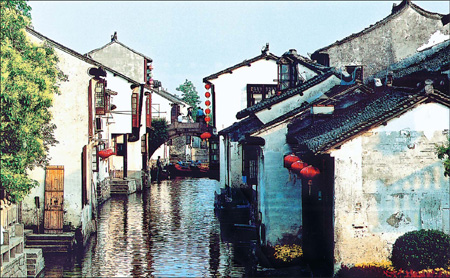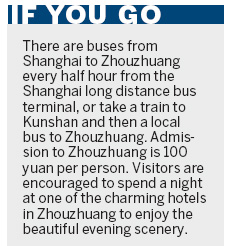

|
 Zhouzhuang is famous for its canals and Ming and Qing dynasty architecture. [provided to china daily] |
Catch the watery views at Zhouzhuang, only 50 kilometers from Shanghai, Wang Bian reports.
| ||||
Situated in Jiangsu province's Kunshan city, only about 50 kilometers from Shanghai, Zhouzhuang offers typical southern Chinese riverside scenery, which features numerous small and ornate bridges, murmuring streams and elegant dwellings. It is an ideal holiday destination when a break from the big city is sorely needed.
Zhouzhuang dates back to the Spring and Autumn Period (770-476 BC), when it was called Zhenfengli. In 1086, during the Northern Song Dynasty (960-1127) it was renamed Zhouzhuang in honor of a benevolent Buddhist named Zhou Digong.
Zhouzhuang has been "rediscovered" in recent decades thanks to the unique beauty of this ancient water town. It has won new popularity and aroused the interest of conservationists. It has also become a popular scenic spot and cultural relic.

In the 1980s, a base for TV and film was established in Zhouzhuang. Since then, more than 100 TV series and films have been shot there, including the award-winning movie Shanghai Triad, which was directed by Zhang Yimou and starred Gong Li.
Taking a gondola, the most convenient form of transport in Zhouzhuang, visitors can enjoy the lovely watery views in a peaceful way, along with typical ancient buildings found along the southern reaches of the Yangtze River, with plenty of local color and customs mixed in.
Zhouzhuang features zigzagging waterways breached by many elegant stone bridges. The small town is surrounded and divided by lakes and rivers, with 14 stone bridges crossing the waterways, each offering distinctive views of the town.
Among them, Twin Bridges (Shuang Qiao) is the most famous because of a painting by the internationally renowned artist, Chen Yifei. The two bridges, the Shide and Yong'an, were built in Wanli era (1573-1619) of the Ming Dynasty. The structures are considered the symbol of Zhouzhuang.
Seeing the ancient residences in Zhouzhuang is also a must. About 60 percent of the town's structures were built during the Ming and Qing dynasties, from 1368 to 1911. Shen House and Zhang House are the two best-known structures and are well worth a visit.
Shen House, built in 1742, was the private property of the descendants of Shen Wansan, one of the richest men in south Yangtze River region in the early Qing Dynasty. Occupying an area of more than 2,000 square meters, the Qing-style house is known for its large scale - with more than 100 rooms. These rooms are divided into three sections, with each section connected by arcades. The first section is the water gate and wharf, where Shen's family moored boats and washed clothes. The middle section includes the gate tower, tearoom, main hall and places for entertaining guests. The last section is the two-story dwelling where the family resided.
You can also visit the Chengxu Taoist Temple, known as Shengtang Hall, which has a history of over 900 years. After several periods of expansion, it is one of the most famous Taoist temples in the south Yangtze River region. Taking in an area of 1,500 square meters, its design is deceptively simple, yet elegant, some even say majestic, with its elaborate workings. It is regarded as a masterpiece of ancient Taoist architecture.
Quanfu Temple and South Lake Garden are two other places worth visiting in Zhouzhuang. You can also visit the town's museum to see examples of traditional regional crafts and fishing implements.
At night, you can watch a special water performance called Zhouzhuang in All Seasons, featuring local folklore, traditions and legends of this water township.
The large-scale performance recounts what life was like along the southern Yangtze River region centuries ago. The performance is unveiled in a classical environment of small bridges, murmuring rivers and riverside homes. The performance projects Zhouzhuang in four seasons: rain in spring, picking lotus root in summer, harvest in autumn, and the New Year in winter. The performance is well regarded and has earned praise around the world for its display of folk customs and traditions portrayed in an artistic and authentic way.
The performance is staged between 7 pm and 8 pm each evening at a water stage at Jiangnan Renjia. Tickets are 150 yuan. You can book at 0512-5720-5622.


